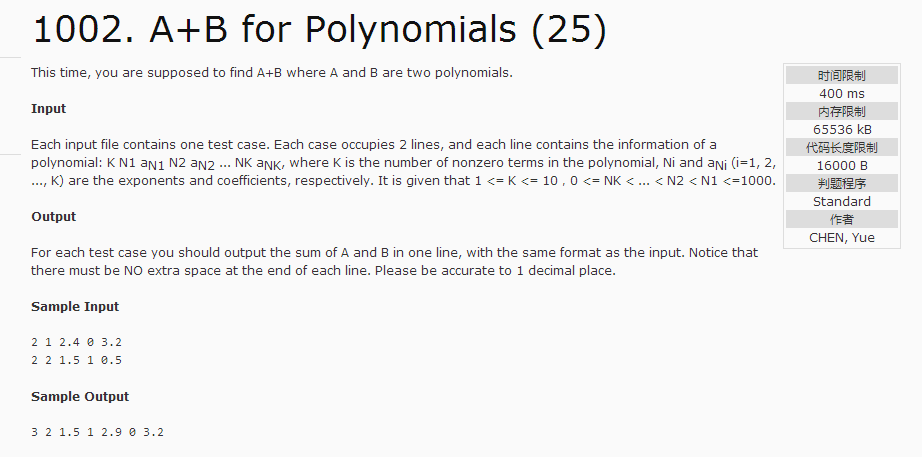原题目如下:
自己第一次写了下程序,开两个数组,然后在合并,再相加,效率很低,而且有几个测试点未通过
#include <iostream>
#include <iomanip>
#define max 1e5
using namespace std;
int main()
{
int temp11,temp21,num,mi;
double xishu;
cin>>temp11;
int temp12[temp11];double temp13[temp11];
for(int i=0;i<temp11;i++)
cin>>temp12[i]>>temp13[i];
cin>>temp21;
int temp22[temp21];double temp23[temp21];
for(int i=0;i<temp21;i++)
cin>>temp22[i]>>temp23[i];
num=temp11+temp21;
int temp1[num];//放入幂指数
double temp2[num];//放入系数
for(int i=0;i<temp11;i++)
{
temp1[i]=temp12[i];//放入第一个多项式的幂指数
temp2[i]=temp13[i];//放入第一个多项式的系数
}
for(int j=0;j<temp21;j++)
{
temp1[temp11+j]=temp22[j];//放入第二个多项式的幂指数
temp2[temp11+j]=temp23[j];//放入第二个多项式的系数
}
for(int i=0;i<num;i++)
{
for(int j=i+1;j<num;j++)
{
if(temp1[i]==temp1[j])
{
num--;
temp2[i]=temp2[i]+temp2[j];//相应系数相加
temp1[j]=max;//将与i相等的后面幂指数赋值无穷大
}
}
}
for(int i=0;i<num;i++)
{
for(int j=i+1;j<num;j++)
{
if(temp1[i]<temp1[j])
{
mi=temp1[j];
temp1[j]=temp1[i];
temp1[i]=mi;
xishu=temp2[j];
temp2[j]=temp2[i];
temp2[i]=xishu;
}
}
}
cout<<num;
for(int i=0;i<num;i++)
{
if(temp1[i]<max)
{
cout<<" ";
cout<<setiosflags(ios::fixed)<<setprecision(1)<<temp1[i]<<' '<<temp2[i];
}
}
}
上面代码太过复杂,本来是一个简单问题,却写的这么长,主要原因是一开始拿到问题没有找到一个合适理想的数据结构存储,后来参考了下别人的方法,太赞了!如果将多项式存储在一个数组里面,数组下标元素为对应多项式幂指数,而数组中存储数值作为多项式系数,这样的话计算就会方便很多,新的代码如下:
#include <iostream>
#include <iomanip>
using namespace std;
int main()
{
float poly[1001]={0};//这个数组用于存放幂指数为n时候,对应系数an是多少
int N1,N2,exp,number=0;//exp用于存放输入时候的幂指数
float coe;//coe用于存放输入时候多项式的系数
cin>>N1;
for (int i=0;i<N1;i++)
{
cin>>exp>>coe;
// if(poly[exp]==0)
// number++;
poly[exp]=poly[exp]+coe;//有可能前后输入的两个多项式的幂指数是相同的
}
cin>>N2;
for (int i=0;i<N2;i++)
{
cin>>exp>>coe;
// if(poly[exp]==0)
// number++;
poly[exp]=poly[exp]+coe;
}
for (int i=1000;i>=0;i--)
{
if(poly[i]!=0)
number++;
}
cout<<number;
for (int i=1000;i>=0;i--)
{
if(poly[i]!=0)
cout<<' '<<i<<' '<<fixed<<setprecision(1)<<poly[i];//注意这个地方保留一位小数用法
}
return 0;
}
源代码中没有用 if (poly[exp]!=0) number++;这种方法来判别最终相加后的多项式之和的非零项个数,是因为有可能前后输入多项式相加刚好为0,这个时候number确增加了一个,这是错误的,所以最后不得已用了一个for循环来查找。找到这个原因之后,可以把代码再稍稍修改一下,下面的也是正确的
#include <iostream>
#include <iomanip>
using namespace std;
int main()
{
float poly[1001]={0};//这个数组用于存放幂指数为n时候,对应系数an是多少
int N1,N2,exp,number=0;//exp用于存放输入时候的幂指数
float coe;//coe用于存放输入时候多项式的系数
cin>>N1;
for (int i=0;i<N1;i++)
{
cin>>exp>>coe;
if(poly[exp]==0)
number++;
poly[exp]=poly[exp]+coe;//有可能前后输入的两个多项式的幂指数是相同的
}
cin>>N2;
for (int i=0;i<N2;i++)
{
cin>>exp>>coe;
if(poly[exp]==0)
number++;
poly[exp]=poly[exp]+coe;
if(poly[exp]==0)
number--;//这里就是为了排除前后相加刚好多项式抵消这种结果
}
cout<<number;
for (int i=1000;i>=0;i--)
{
if(poly[i]!=0)
cout<<' '<<i<<' '<<fixed<<setprecision(1)<<poly[i];//注意这个地方保留一位小数用法
}
return 0;
}
综上来看,按照最终提交结果第二种方法是最简单的,占用内存最少。























 241
241











 被折叠的 条评论
为什么被折叠?
被折叠的 条评论
为什么被折叠?








